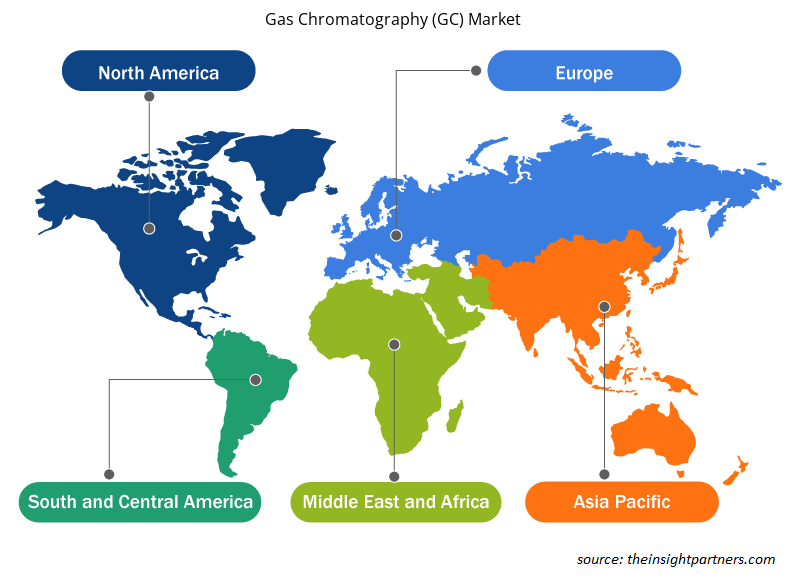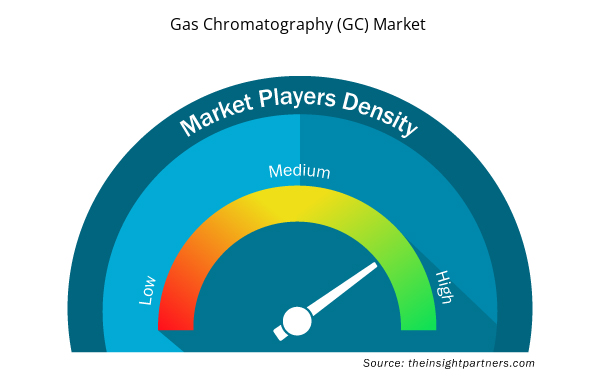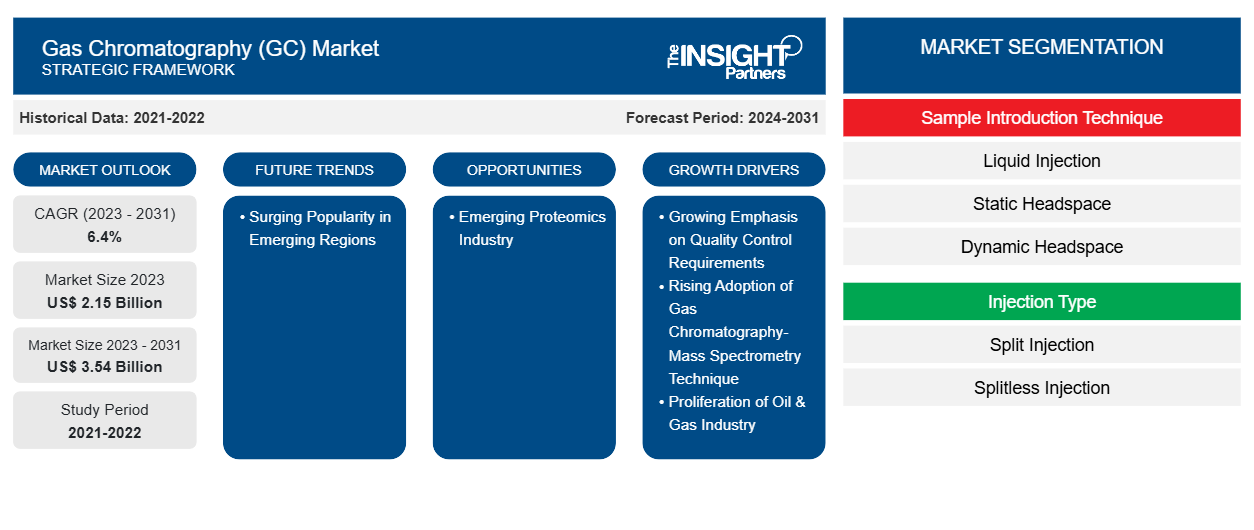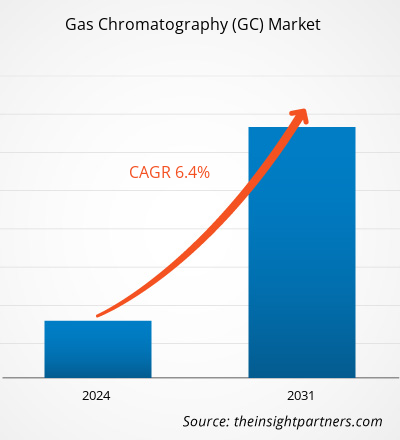气相色谱 (GC) 市场规模预计将从 2023 年的 21.5 亿美元增至 2031 年的 35.4 亿美元。预计 2023-2031 年期间该市场的复合年增长率为 6.4%。
预计气相色谱解决方案在新兴地区的日益普及将为预测期内的气相色谱 (GC) 市场带来新的增长趋势。
气相色谱 (GC) 市场分析
对严格质量控制规程的需求推动了对气相色谱仪器和耗材的需求。汽车、烹饪艺术、石化和环境管理等行业优先考虑对其产品和工艺进行彻底检查。气相色谱通过有效分离、识别和量化复杂化合物和混合物,在保证原材料、中间体和最终产出的完整性方面发挥着至关重要的作用。管理这些行业的监管机构实施了严格的标准,以确保公众福祉和环境和谐。为了满足这些标准,组织投资于先进的气相色谱仪器和团队,以确保合规性并检测出可能影响产品质量的最小杂质和污染物。气相色谱识别痕量异常的能力对于防止质量差异至关重要。
气相色谱 (GC) 市场概览
气相色谱法是一种分析技术,用于制药、环境分析、食品和饮料、法医和石化行业等,用于分离和分析可以转化为气态或液态而不会分解的化合物。它是测试物质纯度的有力工具。气相色谱法的过程包括将气态或液态样品注入流动相(称为载气),载气将样品运送到固定相。流动相通常是惰性气体,例如氦气、氩气、氮气或氢气。固定相可以是固体或液体,具体取决于具体应用。样品组分根据其对每个相的亲和力在固定相和流动相之间分离。当组分通过色谱柱时,它们会与固定相相互作用,从而根据不同的保留时间实现分离。高灵敏度、快速分析时间和广泛的分析范围(涉及广泛的化合物)是气相色谱法的主要优点。该技术提供有关样品成分的定量和定性信息,从而可以准确识别和量化各个成分。
定制此报告以满足您的需求
您可以免费定制任何报告,包括本报告的部分内容、国家级分析、Excel 数据包,以及为初创企业和大学提供优惠和折扣
- 获取此报告的关键市场趋势。这个免费样品将包括数据分析,从市场趋势到估计和预测。
气相色谱 (GC) 市场驱动因素和机遇
石油和天然气工业的扩张
石油和天然气行业是全球最重要的行业之一,截至 2022 年,全球收入高达 5 万亿美元。工业在全球经济格局中发挥着举足轻重的作用。石油是一种重要的资源,影响着商业运营的各个方面,从为运输系统提供动力到为住宅和商业提供热能和电力,从而帮助工业生产和制造过程。气相色谱法是石油和天然气行业不可或缺的分析工具,特别是在处理含有多种不同成分的复杂原油样品时。该技术被广泛用于分析石油供应链每个阶段的样品,从勘探和生产到运输和精炼。它可以对原材料和精炼成品进行全面分析。分析师使用气相色谱法模拟原油蒸馏过程,优化产量并最大程度地提高效率。满足成品的质量和一致性是石油和天然气企业的首要任务,确保符合法规要求和客户满意度。 LowOx UOP 960 分析仪是炼油厂使用的一种专用仪器,它利用气相色谱法检测液化石油气 (LPG)、石脑油和其他气流中单个氧化物的痕量水平,从而使其能够遵守严格的质量标准和监管要求。
新兴蛋白质组学产业
蛋白质组学是一门研究蛋白质及其功能的学科,在制药、生物技术和医疗保健等行业中发挥着至关重要的作用。气相色谱法是一种强大的分析技术,可以分离和分析包括蛋白质在内的复杂混合物。将气相色谱法纳入蛋白质组学为研究和开发开辟了新的途径。通过在蛋白质组学分析中使用气相色谱法,科学家可以有效地分离和识别蛋白质,从而更深入地了解它们的结构、功能和相互作用。这些信息对于药物发现、生物标志物识别和个性化医疗等应用至关重要。随着蛋白质组学在各个行业中的地位不断提高,需要精确可靠的工具来简化分析过程。气相色谱法具有高分辨率、灵敏度和可重复性,使其成为蛋白质组学研究的理想选择。例如,Creative Proteomics 提供具有电子电离 (EI) 和化学电离 (CI) 功能的 Finnigan TRACE DSQ GC-MS 系统,可以识别低至十亿分之一水平的未知化合物。因此,蓬勃发展的蛋白质组学领域为气相色谱(GC)市场提供了巨大的机遇。
气相色谱(GC)市场报告细分分析
“气相色谱法 (GC) 市场分析”通过考虑以下几个部分来进行:样品引入技术、注射类型、检测器类型、最终用户和地理位置。
- 根据检测器类型,气相色谱 (GC) 市场细分为火焰离子化检测器、热导检测器、电子捕获检测器、热离子特定检测器、火焰光度检测器、光电离检测器、质谱仪等。2023 年,火焰离子化检测器部分在气相色谱 (GC) 市场中占有最大份额。火焰离子化检测器 (FID) 因其出色的灵敏度和选择性而广泛应用于 GC。它的工作原理是在氢-空气火焰中电离有机化合物,产生带电粒子,并以电流的形式进行测量。该过程允许对包括碳氢化合物在内的各种分析物进行精确的化合物检测,使其成为石化、环境分析和食品安全等行业不可或缺的一部分。FID 的高灵敏度使得能够检测和量化低水平的化合物,确保准确的结果并符合监管标准。这在制药和环境监测等行业尤为重要,因为精确的测量对于质量控制和安全至关重要。
气相色谱 (GC) 市场份额(按地区)分析
气相色谱(GC)市场报告的地理范围主要分为五个区域:北美、亚太、欧洲、中东和非洲、南美和中美。
2023 年,北美占据气相色谱 (GC) 市场的最大份额,其次是欧洲和亚太地区。北美在石油和天然气以及能源等多个行业都经历了增长,这支持了北美气相色谱 (GC) 市场的发展。该地区是大多数气相色谱 (GC) 市场参与者的所在地,这是推动北美采用气相色谱技术的关键因素之一。该地区的国家正在进一步投资建设新的炼油厂和发电厂,从而产生了对气体分析技术的需求。
气相色谱 (GC) 市场新闻和最新发展
气相色谱 (GC) 市场通过收集一手和二手研究后的定性和定量数据进行评估,其中包括重要的公司出版物、协会数据和数据库。以下是市场发展情况的列表:
- 2023 年,VUV Analytics, Inc. 筹集了 2000 万美元股权融资(由现有投资者 S3 Ventures 和 New Science Ventures 领投),使其总融资额超过 3600 万美元。在此之前,该公司最近推出了 LUMA 产品,创下了收入记录,其单位销售运行率同比增长一倍。(来源:VUV Analytics, Inc,新闻稿)
- 2022 年,诊断、生命科学、食品和环境市场端到端解决方案的全球领导者 PerkinElmer 宣布与 P1 Fuels建立长期合作伙伴关系,P1 Fuels 是一家专门为赛车队和汽车行业配制、生产和交付先进无化石燃料的专家。此次合作的最终目标是帮助汽车行业(包括赛车运动)过渡到气候中性的无化石燃料。PerkinElmer 通过其气相色谱和红外光谱平台对燃料及其化学成分进行快速可靠的分析,在向可持续出行的过渡中发挥了关键作用。P1 Fuels 在其柏林总部以及赛道旁使用 PerkinElmer 的技术进行质量控制检查。(来源:PerkinElmer,新闻稿)
气相色谱 (GC) 市场区域洞察
Insight Partners 的分析师已详尽解释了预测期内影响气相色谱 (GC) 市场的区域趋势和因素。本节还讨论了北美、欧洲、亚太地区、中东和非洲以及南美和中美洲的气相色谱 (GC) 市场细分和地理位置。

- 获取气相色谱 (GC) 市场的区域特定数据
气相色谱 (GC) 市场报告范围
| 报告属性 | 细节 |
|---|---|
| 2023 年的市场规模 | 21.5亿美元 |
| 2031 年市场规模 | 35.4亿美元 |
| 全球复合年增长率(2023 - 2031) | 6.4% |
| 史料 | 2021-2022 |
| 预测期 | 2024-2031 |
| 涵盖的领域 | 按样品引入技术
|
| 覆盖地区和国家 | 北美
|
| 市场领导者和主要公司简介 |
|
气相色谱 (GC) 市场参与者密度:了解其对业务动态的影响
气相色谱 (GC) 市场正在快速增长,这得益于终端用户需求的不断增长,而这些需求又源于消费者偏好的不断变化、技术进步以及对产品优势的认识不断提高等因素。随着需求的增加,企业正在扩大其产品范围,进行创新以满足消费者的需求,并利用新兴趋势,从而进一步推动市场增长。
市场参与者密度是指在特定市场或行业内运营的企业或公司的分布情况。它表明在给定市场空间中,相对于其规模或总市场价值,有多少竞争对手(市场参与者)存在。
在气相色谱 (GC) 市场运营的主要公司有:
- 安捷伦科技
- 岛津制作所
- 赛默飞世尔科技公司
- 珀金埃尔默公司
- Restek 公司
- VUV 分析公司
免责声明:上面列出的公司没有按照任何特定顺序排列。

- 获取气相色谱 (GC) 市场顶级关键参与者概览
气相色谱 (GC) 市场报告覆盖范围和交付成果
“气相色谱 (GC) 市场规模和预测 (2021-2031)”报告对以下领域进行了详细的市场分析:
- 范围内涵盖的所有主要细分市场的全球、区域和国家层面的市场规模和预测。
- 市场动态,如驱动因素、限制因素和关键机遇
- 未来的主要趋势
- 详细的 PEST/波特五力分析和 SWOT 分析
- 全球和区域市场分析涵盖主要市场趋势、主要参与者、法规和最新的市场发展。
- 行业格局和竞争分析,包括市场集中度、热图分析、知名参与者和最新发展。
- 详细的公司简介
- 历史分析(2 年)、基准年、预测(7 年)及复合年增长率
- PEST 和 SWOT 分析
- 市场规模价值/数量 - 全球、区域、国家
- 行业和竞争格局
- Excel 数据集



Report Coverage
Revenue forecast, Company Analysis, Industry landscape, Growth factors, and Trends

Segment Covered
This text is related
to segments covered.

Regional Scope
North America, Europe, Asia Pacific, Middle East & Africa, South & Central America

Country Scope
This text is related
to country scope.
常见问题
The gas chromatography (GC) market was estimated to be valued at US$ 2.14 billion in 2023 and is anticipated to grow at a CAGR of 6.4% over the forecast period.
The growing emphasis on quality control requirements, rising adoption of gas chromatography-mass spectrometry technique, and the growth in the oil and gas industry, are driving the growth of the gas chromatography (GC) market.
The key players holding majority shares in the gas chromatography (GC) market include Agilent Technologies, Inc., Thermo Fisher Scientific Inc., Shimadzu Corporation, PerkinElmer, Inc., and Restek Corporation.
The surging popularity of gas chromatography in emerging regions is expected to drive the growth of the gas chromatography (GC) market in the coming years.
The flame ionization detector segment led the gas chromatography (GC) market with a significant share in 2023.
The gas chromatography (GC) market is expected to reach US$ 3.53 Billion by 2031.
Asia Pacific is anticipated to grow at the fastest CAGR over the forecast period.
Trends and growth analysis reports related to Electronics and Semiconductor : READ MORE..
The List of Companies - Gas Chromatography (GC) Market
- Agilent Technologies
- Shimadzu Corporation
- Thermo Fisher Scientific, Inc.
- Restek Corporation
- VUV Analytics, Inc.
- Wasson ECE Instrumentation
- YOUNGIN Chromass
- Da Vinci Laboratory Solutions B.V.
- Separation Systems, Inc.
- Merck KGaA
- PerkinElmer
The Insight Partners performs research in 4 major stages: Data Collection & Secondary Research, Primary Research, Data Analysis and Data Triangulation & Final Review.
- Data Collection and Secondary Research:
As a market research and consulting firm operating from a decade, we have published and advised several client across the globe. First step for any study will start with an assessment of currently available data and insights from existing reports. Further, historical and current market information is collected from Investor Presentations, Annual Reports, SEC Filings, etc., and other information related to company’s performance and market positioning are gathered from Paid Databases (Factiva, Hoovers, and Reuters) and various other publications available in public domain.
Several associations trade associates, technical forums, institutes, societies and organization are accessed to gain technical as well as market related insights through their publications such as research papers, blogs and press releases related to the studies are referred to get cues about the market. Further, white papers, journals, magazines, and other news articles published in last 3 years are scrutinized and analyzed to understand the current market trends.
- Primary Research:
The primarily interview analysis comprise of data obtained from industry participants interview and answers to survey questions gathered by in-house primary team.
For primary research, interviews are conducted with industry experts/CEOs/Marketing Managers/VPs/Subject Matter Experts from both demand and supply side to get a 360-degree view of the market. The primary team conducts several interviews based on the complexity of the markets to understand the various market trends and dynamics which makes research more credible and precise.
A typical research interview fulfils the following functions:
- Provides first-hand information on the market size, market trends, growth trends, competitive landscape, and outlook
- Validates and strengthens in-house secondary research findings
- Develops the analysis team’s expertise and market understanding
Primary research involves email interactions and telephone interviews for each market, category, segment, and sub-segment across geographies. The participants who typically take part in such a process include, but are not limited to:
- Industry participants: VPs, business development managers, market intelligence managers and national sales managers
- Outside experts: Valuation experts, research analysts and key opinion leaders specializing in the electronics and semiconductor industry.
Below is the breakup of our primary respondents by company, designation, and region:

Once we receive the confirmation from primary research sources or primary respondents, we finalize the base year market estimation and forecast the data as per the macroeconomic and microeconomic factors assessed during data collection.
- Data Analysis:
Once data is validated through both secondary as well as primary respondents, we finalize the market estimations by hypothesis formulation and factor analysis at regional and country level.
- Macro-Economic Factor Analysis:
We analyse macroeconomic indicators such the gross domestic product (GDP), increase in the demand for goods and services across industries, technological advancement, regional economic growth, governmental policies, the influence of COVID-19, PEST analysis, and other aspects. This analysis aids in setting benchmarks for various nations/regions and approximating market splits. Additionally, the general trend of the aforementioned components aid in determining the market's development possibilities.
- Country Level Data:
Various factors that are especially aligned to the country are taken into account to determine the market size for a certain area and country, including the presence of vendors, such as headquarters and offices, the country's GDP, demand patterns, and industry growth. To comprehend the market dynamics for the nation, a number of growth variables, inhibitors, application areas, and current market trends are researched. The aforementioned elements aid in determining the country's overall market's growth potential.
- Company Profile:
The “Table of Contents” is formulated by listing and analyzing more than 25 - 30 companies operating in the market ecosystem across geographies. However, we profile only 10 companies as a standard practice in our syndicate reports. These 10 companies comprise leading, emerging, and regional players. Nonetheless, our analysis is not restricted to the 10 listed companies, we also analyze other companies present in the market to develop a holistic view and understand the prevailing trends. The “Company Profiles” section in the report covers key facts, business description, products & services, financial information, SWOT analysis, and key developments. The financial information presented is extracted from the annual reports and official documents of the publicly listed companies. Upon collecting the information for the sections of respective companies, we verify them via various primary sources and then compile the data in respective company profiles. The company level information helps us in deriving the base number as well as in forecasting the market size.
- Developing Base Number:
Aggregation of sales statistics (2020-2022) and macro-economic factor, and other secondary and primary research insights are utilized to arrive at base number and related market shares for 2022. The data gaps are identified in this step and relevant market data is analyzed, collected from paid primary interviews or databases. On finalizing the base year market size, forecasts are developed on the basis of macro-economic, industry and market growth factors and company level analysis.
- Data Triangulation and Final Review:
The market findings and base year market size calculations are validated from supply as well as demand side. Demand side validations are based on macro-economic factor analysis and benchmarks for respective regions and countries. In case of supply side validations, revenues of major companies are estimated (in case not available) based on industry benchmark, approximate number of employees, product portfolio, and primary interviews revenues are gathered. Further revenue from target product/service segment is assessed to avoid overshooting of market statistics. In case of heavy deviations between supply and demand side values, all thes steps are repeated to achieve synchronization.
We follow an iterative model, wherein we share our research findings with Subject Matter Experts (SME’s) and Key Opinion Leaders (KOLs) until consensus view of the market is not formulated – this model negates any drastic deviation in the opinions of experts. Only validated and universally acceptable research findings are quoted in our reports.
We have important check points that we use to validate our research findings – which we call – data triangulation, where we validate the information, we generate from secondary sources with primary interviews and then we re-validate with our internal data bases and Subject matter experts. This comprehensive model enables us to deliver high quality, reliable data in shortest possible time.


 获取此报告的免费样本
获取此报告的免费样本